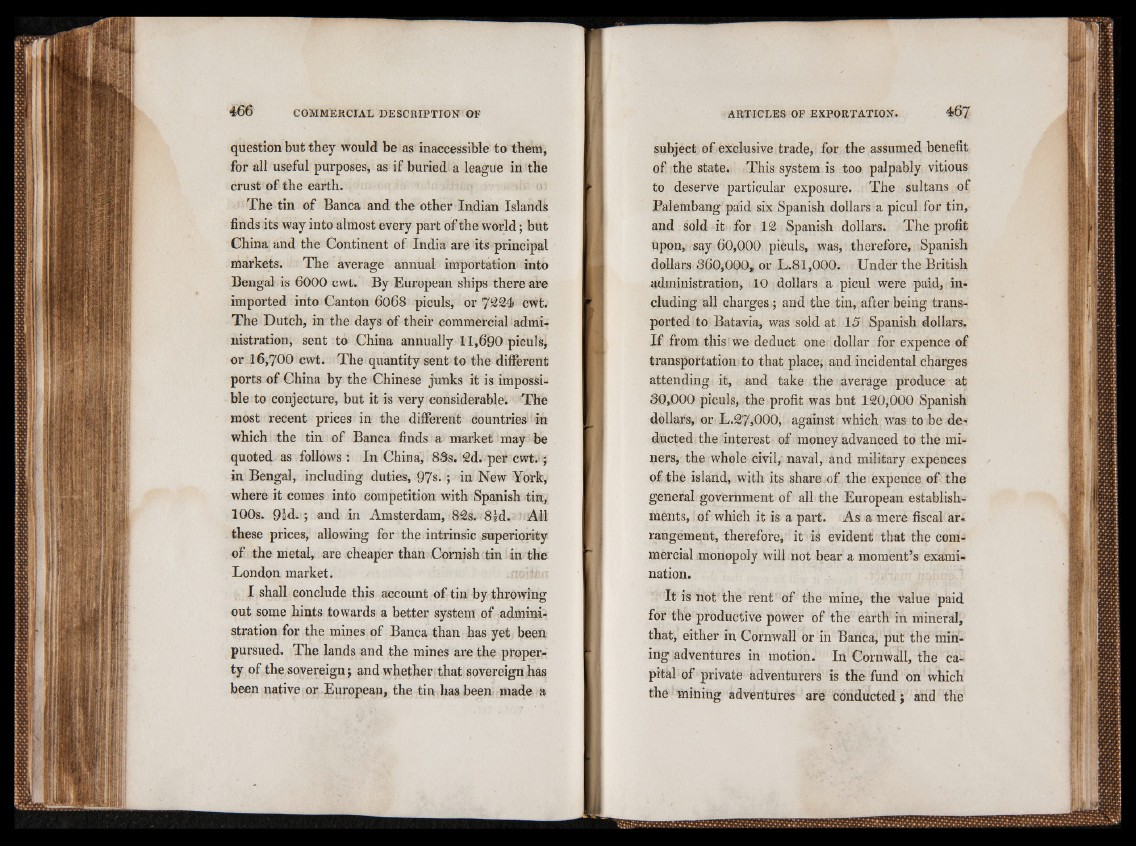
question but they would be as inaccessible to them,
for all useful purposes, as if buried a league in the
crust of the earth.
The tin of Banca and the other Indian Islands
finds its way into almost every part of the world; but
China and the Continent of India are its principal
markets. The average annual importation into
Bengal is 6000 cwt. By European ships there are
imported into Canton 6068 piculs, or 7224 cwt.
The Dutch, in the days of their commercial admi-
nistration, sent to China annually ■11,690 piculs,
or 16,700 cwt. The quantity sent to the different
ports of China by the Chinese junks it is impossible
to conjecture, but it is very considerable. The
most recent prices in the different countries in
which the tin of Banca finds a market may be
quoted as follows: In China, 83s. 2d. per cwt.-;
in Bengal, including duties, 97s. ; in New York,
where it comes into competition with Spanish tin,
100s. 9 Id. ; and in Amsterdam, 82s. 83d. All
these prices, allowing for the intrinsic superiority
of the metal, are cheaper than Cornish tin in the
London market.
I shall conclude this account of tin by throwing
out some hints towards a better system of administration
for the mines of Banca than has yet been
pursued. The lands and the mines are the property
of the sovereign j and whether that sovereign has
been native or European, the tin has been made a
subject of exclusive trade, for the assumed benefit
of the state. This system is too palpably vitious
to deserve particular exposure. The sultans of
Palembang paid six Spanish dollars a picul for tin,
and sold it for 12 Spanish dollars. The profit
upon, say 60,000 piculs, was, therefore, Spanish
dollars 360,000* or L.81,000. Under the British
administration, 10 dollars a picul were paid, including
all charges ; and the tin, after being transported
to Batavia, was sold at 15 Spanish dollars.
If from thisr we deduct one dollar for expence of
transportation to that place* and incidental charges
attending it, and take the average produce at
30,000 piculs, the profit was but 120,000 Spanish
dollars, or L.27>000, against which was to be deducted
the interest of money advanced to the miners,
the whole civil, naval, and military expences
of the island, with its share of the expence of the
general govei’nment of all the European establishments,
of which it is a part. As a mere fiscal arrangement,
therefore, it is evident that the commercial
monopoly will not bear a moment’s examination.
It is not the rent of the mine, the value paid
for the productive power of the earth in mineral,
that, either in Cornwall or in Banca, put the mining
adventures in motion. In Cornwall, the capital
of private adventurers is the fund on which
the mining adventures are conducted j and the